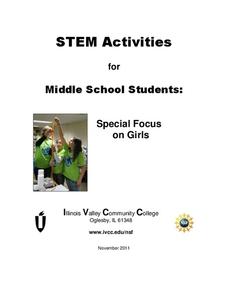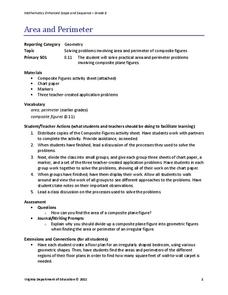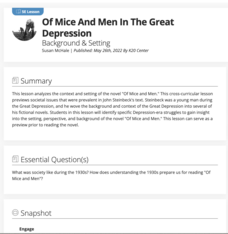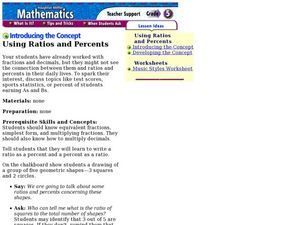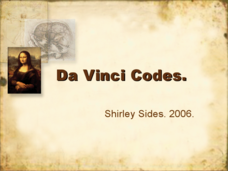It's About Time
The Mu of the Shoe
What is mu? Emerging scientists explore the coefficient of sliding friction, or mu, and apply its concepts as they complete activities in the interesting lesson. They measure the sliding friction between soles of their own athletic shoes...
Flipping Physics
AP Physics 1: Simple Harmonic Motion Review
Does your class feel unprepared for the upcoming exam? Use this video to review the simple harmonic motion concepts that will appear on the AP Physics exam. While maintaining interest and a fast pace, the presenter not only reviews the...
Chicago Teachers Union Quest Center
Factored Form of a Quadratic Function
Build upon linear functions to learn about quadratics. The instructional activity introduces the concept of zeros for quadratic functions and makes the connection to the linear factors of the function. It presents quadratics in both...
Illinois Valley Community College
STEM Activities for Middle School Students
Use STEM activities within the class to provide connections to concepts. The resource includes activities that range from working with buoyancy to building rockets and launching them. Other activities involve the engineering design...
EngageNY
Estimating Quantities
Apply the concept of magnitude to estimate values and compare numbers. The ninth lesson of the 15-part series asks learners to write numbers to their next greatest power of 10 and then make comparisons. Scholars begin to understand the...
Virginia Department of Education
Area and Perimeter
Develop a strategy for finding the area and perimeter of irregular figures. Building on an understanding of finding area and perimeter of rectangles and triangles, learners apply the same concepts to composite figures. After practicing...
Curriculum Corner
Fifth Grade Summer Math Booklet
A 33-page packet focuses on fifth-grade math concepts. Learners practice rounding numbers to the hundred thousands, thousands, hundreds, tens, ones, hundredths, thousandths, and hundred thousandths. They also compare whole numbers and...
Brigham Young University
Creating a Design Concept
Putting together information gained from their script analysis, their readings, and their research, groups create a conceptual design statement for their assigned scene. The statement explains how their scenic design creates the mood and...
DiscoverE
Foil Boats
How many pennies can an aluminum foil boat hold? That is the challenge in a collaborative activity designed to explore the concept of buoyancy. Learners use aluminum foil to build makeshift boats and test the weight they hold before...
PBS
The Supreme Court: Civil Rights and Civil Liberties
While World War II changed the international order, it also led to a fundamental shift in the concept of civil rights within the United States. Using a video and discussion questions, class members consider the effects the war had to the...
Rice University
Elementary Algebra
Find all the Algebra 1 content in one location. A helpful eBook contains the content typically found in an Algebra 1 course. Concepts range from solving and graphing linear equations to solving and graphing quadratic equations. Pupils...
Anti-Defamation League
Women's Suffrage, Racism, and Intersectionality
The Nineteenth Amendment granted women the right to vote—as long as they were white. High schoolers read articles and essays about racism in the suffrage movement and consider how intersectionality played a role in the movement. Scholars...
K20 LEARN
Of Mice and Men in the Great Depression: Background and Setting
What were living conditions like in the United States during The Great Depression, and how do those conditions compare with today? That's the question young scholars consider as they prepare to read John Steinbeck's Of Mice and Men....
Scholastic
What Are Clouds Made Of?
Tiny bubbles, in my...clouds? Offer youngsters a hands-on, visual learning experience when reviewing the scientific concepts of condensation, water vapor, and the collection of droplets that make up clouds.
Curated OER
introducing the Concept: Using Ratios and Percents
Young scholars convert decimals and fractions to percents. In this introductory percents lesson, learners work with equivalent fractions and learn to draw ratios. They recognize how to change a fraction to a percent.
Institute of Electrical and Electronics Engineers
Playing with Parachutes
This lesson certainly will not be a drag! Little engineers design parachutes that make use of air resistance and, as a result, slow the descent of the payload as much as possible. It is an opportunity to teach about many motion concepts:...
Curated OER
Cartoons for the Classroom: College as Concept
In this current events worksheet, students analyze a political cartoon about the college application process and respond to 3 talking point questions.
Curated OER
Residential Power System
Perform data analysis on energy consumption to apply algebraic expressions to the real world. Learners will write and solve equations that answer various questions from residential power use. They will collect data at home and calculate...
Curated OER
The Mole Concept
The need for a counting unit is mentioned as you introduce the mole to your young chemists. Use this presentation to explain Avogadro's number and describe the incredible quantity it represents. Lecture notes are included for most of the...
Curated OER
The Da Vinci Code: Math Fun
A wonderful way to introduce or practice simple algebraic equations, where a variable is used in place of a number. Learners will work to crack the Da Vinci Code (as it is called) and replace letter variables with the "code" numbers to...
K12 Reader
The Pitch and Volume of Sound
Primary graders are introduced to the concepts of pitch and volume with a reading comprehension learning exercise that focuses on the physics of sound.
K12 Reader
Expressions with Parentheses
Introduce your class to the order of operations. Included here is a reading passage that explains the concepts and provides an example and five related questions for individuals to answer.
Media Smarts
Truth or Money
Two compelling texts about tobacco companies' influence over editorial content in print media introduce readers to the concept of advertising censorship. After study and discussion, class members compose a mock "final column" by a...
Illustrative Mathematics
Representing Half of a Circle
Geometric shapes make great visual models for introducing young mathematicians to the concept of fractions. Looking at a series of four circles, learners are asked to determine whether or not one half of each circle is shaded. To support...





